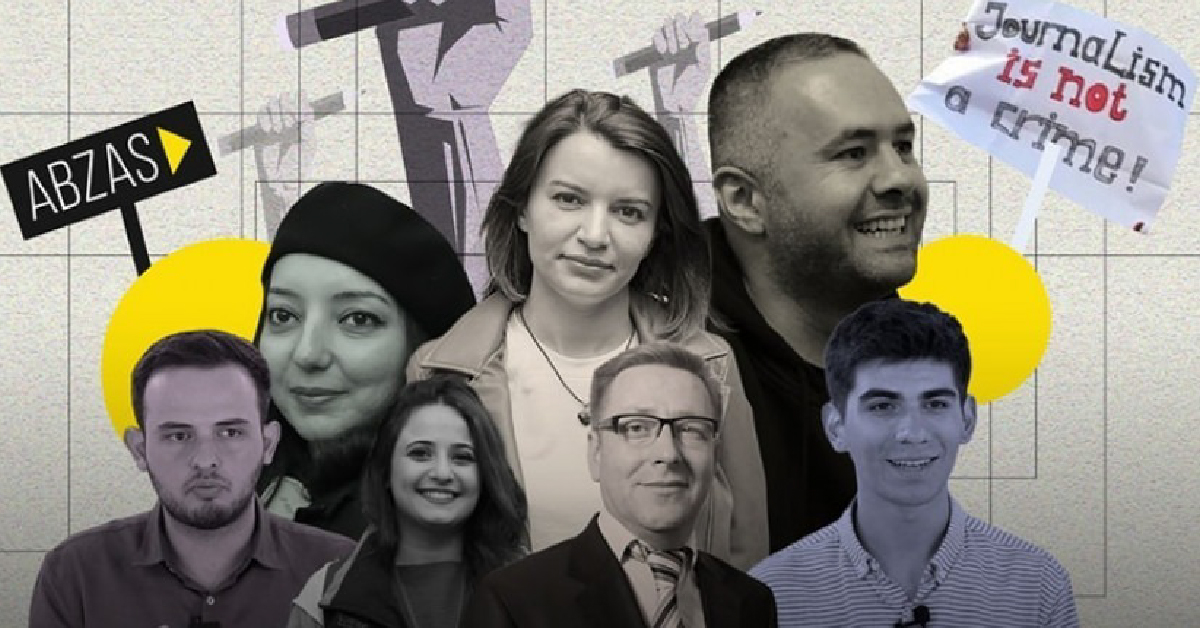“GEGHARD”
SCIENTIFIC ANALYTICAL
FOUNDATION
2026
2026
2025-07-04

Seven journalists who exposed large-scale corruption related to construction projects in Nagorno-Karabakh have been sentenced in Azerbaijan to 7–9 years in prison. Moreover, the journalists were convicted on fabricated charges, and according to the defense team, witnesses in the case retracted or denied their previous statements under pressure. The imprisoned journalists have repeatedly raised alarm about inhumane treatment in Azerbaijani prisons.
The European Union has expressed its concern regarding the pressure and imprisonment of journalists, calling on Azerbaijan to respect human rights and fundamental freedoms, uphold its international obligations, and take immediate steps to ensure a safe and enabling environment for all journalists and media workers.
The EU statement followed the verdicts issued on June 20 against the journalists and staff of Abzas Media, an outlet considered an independent news platform in Azerbaijan. The Baku Grave Crimes Court sentenced Abzas Media director Ulvi Hasanli, editor-in-chief Sevinj Vagifqizi, investigative journalist Hafiz Babali, “Radio Liberty” journalist and economist Farid Mehralizade to nine years in prison. Journalists Nargiz Absalamova and Elnara Gasimova were sentenced to 8 years, while deputy director Mahammad Kekalov received a 7.5-year prison sentence.
Abzas Media’s journalists were arrested in late 2023, while Radio Liberty journalist Farid Mehralizadeh was detained in May 2024. Although Abzas Media stated that the Radio Liberty journalist was not their employee and had no connection to their organization, Mehralizade was arrested within the framework of the same case. The journalist has claimed that he is being persecuted for his economic investigations conducted at Radio Liberty. “The Prosecutor’s Office has also ‘appointed’ me as an Abzas Media employee, claiming I worked there as an economic expert and was based in their office. These claims are false,” the journalist said.
The detainees have been charged with “currency smuggling,” “money laundering,” “tax evasion,” and “forgery of documents.” They reject the charges brought against them, stating that their arrests are politically motivated and connected to their investigations into corruption. Specifically, their reporting concerns the post-2020 war construction works in Nagorno-Karabakh, as well as illegal financial networks involving government-affiliated companies.
“...In countries where the rule of law and the independence of the judiciary are not respected, judicial processes are nothing more than a fake smile from authoritarian governments.” in his final statement, Mehralizade said he understands “that the verdict will not be the verdict of the judges, but of those who ordered arrest.”
Several international human rights organizations have also reacted to the pressure on journalists and the recent convictions in Azerbaijan, issuing particularly strong statements condemning the actions.
“The case against Abzas Media is an example of how Azerbaijan’s judicial system is being weaponized to muzzle independent journalism and calls for a strong international response,” Amnesty International mentioned and added that the political repression in Azerbaijan is alarming, yet the international community lacks a united and principled stand.
Reporters Without Borders (RSF) also condemned the court’s decision, which is “a symbol of the authorities’ systematic repression of the independent press.”
The Committee to Protect Journalists (CPJ) stated that the authorities intend to eliminate the last remnants of independent journalism in the country, describing the pressure on free speech and the media in Azerbaijan.
International Press Institute condemned the prison sentences emphasizing that “journalists’ only crime was to report on high-level corruption involving Azerbaijan’s ruling elite.”
According to the statement by International Federation of Journalists (IFJ), the imprisonment is retaliation for their investigations into corruption among Ilham Aliyev’s inner circle.
International organizations have also reacted to the case of Azerbaijani activist Bahruz Samedov, who was sentenced to 15 years in prison by the Baku Grave Crimes Court on June 23. Samedov was accused of state treason, specifically of allegedly collaborating with Armenian intelligence services. Both Samedov and his defense have denied the charges, insisting that the real reason for his arrest is his pacifist and anti-war articles—something that “is reflected in the case materials.”
According to the Committee to Protect Journalists (CPJ) 2024 annual report, Azerbaijan ranks 10th among the countries with the highest number of imprisoned journalists.
Reporters Without Borders (RSF) has noted that press freedom in Azerbaijan is gradually deteriorating. According to the organization's Press Freedom Index, Azerbaijan ranked 164th out of 180 countries in 2024, and 167th in 2025.
According to data published in June by the NGO Free Azerbaijan Political Prisoners, the number of imprisoned journalists and bloggers in Azerbaijan is 29. Meanwhile, the Council of Europe’s Safety of journalists platform reports that the current number of incarcerated journalists has reached 36. This is the highest figure among the Council of Europe member states since Azerbaijan joined the organization in 2001.
Despite international reactions and calls, the Azerbaijani authorities continue to disregard their international obligations and fundamental human rights. While international organizations only express concern, Baku becomes increasingly brazen in its actions, tightening control over free speech, civil society, and journalists.